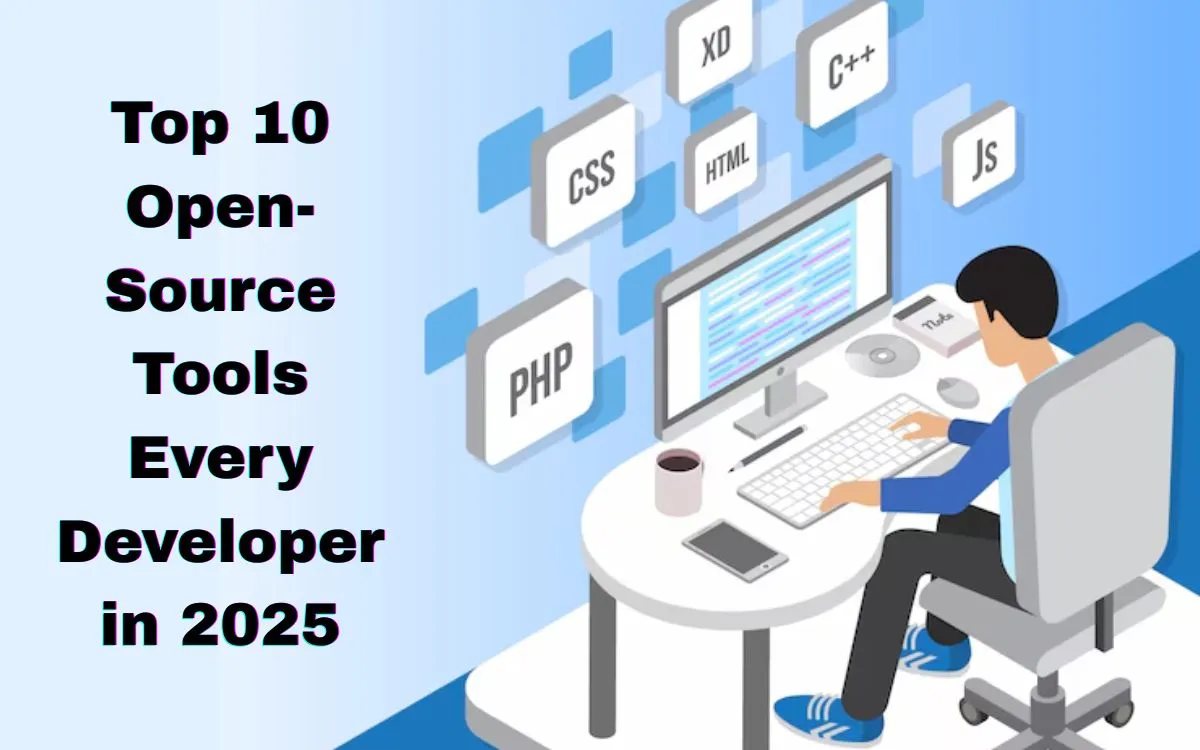Introduction: The Power of Open Source in 2025
In 2025, the tech landscape is evolving faster than ever — and open-source tools are leading the charge. Whether you’re a beginner learning to code in your college hostel in Hyderabad, a freelance developer in Bengaluru, or a software engineer working remotely from Jaipur — open-source software is at the heart of innovation.
Why? Because open-source tools are free, community-driven, flexible, and often more powerful than many paid alternatives. Plus, contributing to open source is now a strong resume booster in the Indian job market.
In this article, we’ll walk you through the Top 10 Open-Source Tools Every Developer Should Know in 2025 — tools that are shaping the way modern developers build, collaborate, and ship software.
Top Open-Source Tools Developers Should Master in 2025
1. Visual Studio Code (VS Code)
Category: Code Editor
Why It’s Essential:
- Lightweight, super fast, and highly customizable
- Huge ecosystem of extensions (e.g., Prettier, ESLint, GitLens)
- Integrated Git, terminal, and debugger
Used by over 80% of Indian developers according to Stack Overflow 2024 survey.
2. Git & GitHub
Category: Version Control & Collaboration
Why It’s Essential:
- Git helps track changes in code and work across teams
- GitHub is the largest open-source hosting platform with community features, Actions (CI/CD), and security alerts
Must-know for every developer, from students to professionals. Many college projects in India are now submitted via GitHub.
3. Docker
Category: Containerization
Why It’s Essential:
- Package and deploy apps in isolated environments
- Simplifies testing and deployment
- Works seamlessly with cloud platforms (AWS, Azure, GCP)
Indian startups use Docker to scale apps without worrying about local setups or OS issues.
4. Postman (Open Source CLI & Collections)
Category: API Development
Why It’s Essential:
- Build, test, and document APIs
- Automate test cases
- Now includes open-source CLI and collaboration via public workspaces
Perfect for backend developers and QA engineers working on RESTful APIs.
5. Node.js
Category: Backend JavaScript Runtime
Why It’s Essential:
- Build scalable web apps, APIs, and real-time systems
- Supported by a massive npm ecosystem
- Works with frameworks like Express, NestJS, and Fastify
Used by major Indian platforms like Flipkart, Swiggy, and Ola.
6. Jupyter Notebook
Category: Data Science & Machine Learning
Why It’s Essential:
- Interactive coding with real-time output
- Popular for Python-based data analysis and ML modeling
- Integrated with tools like Pandas, Matplotlib, and TensorFlow
Highly recommended for students preparing for data science roles or AI-focused careers.
7. Kubernetes
Category: Container Orchestration
Why It’s Essential:
- Manage and scale containerized apps
- Supports rolling updates, load balancing, and automated rollbacks
- Works well with Docker
DevOps professionals in India are seeing huge demand for Kubernetes knowledge in mid to senior-level roles.
8. React.js
Category: Frontend JavaScript Library
Why It’s Essential:
- Build dynamic, single-page applications (SPAs)
- Component-based architecture
- Backed by Facebook and used by startups globally
Most front-end jobs in India require React knowledge as a core skill.
9. Apache Kafka
Category: Real-Time Data Streaming
Why It’s Essential:
- Handle large volumes of real-time data
- Used in fintech, telecom, and e-commerce sectors
- Integrates with big data platforms like Hadoop and Spark
Indian banking systems and logistics tech platforms are adopting Kafka for event-based architectures.
10. OpenAI API (ChatGPT, Codex SDKs)
Category: AI/ML & Developer Productivity
Why It’s Essential:
- Access GPT-based language models via API
- Build chatbots, AI code helpers, and productivity tools
- Now open-source SDKs available in Python, Node.js, etc.
Indian devs are integrating AI in education, HR, healthcare, and SaaS apps rapidly.
Bonus Mentions: Tools You Should Explore
- GIMP – Free Photoshop alternative for UI design
- Godot Engine – Open-source game development
- Prometheus + Grafana – DevOps monitoring stack
- FastAPI – Blazing fast web APIs using Python
Why Developers in India Should Embrace Open Source
- Make in India + Contribute Globally: Developers from India are now major contributors to open-source projects.
- Career Growth: GitHub profiles with public projects are often valued more than resumes.
- Cost Savings: Open-source tools are free, making them ideal for startups, students, and freelancers.
- Community Learning: Thousands of tutorials, forums, and Indian developer communities on Reddit, Discord, and Telegram.
How to Get Started with Open Source (Beginner Tips)
- Start Small: Contribute to documentation or fix beginner-friendly issues.
- Use GitHub’s “Good First Issue” label.
- Join Open Source India Events or Hackathons.
- Follow Indian contributors like Tanay Pratap, Kunal Kushwaha for inspiration.
- Document your learning via blogs or GitHub READMEs.
Read Also: Low-Code/No-Code Revolution: How Anyone Can Build Apps in 2025
Conclusion: Open Source Is the Future — Start Exploring Today
The open-source movement in 2025 isn’t just about tools – it’s about collaboration, empowerment, and opportunity. Whether you’re in engineering college, working in IT, or freelancing — mastering these tools will set you apart.
Start with one tool, build something small, and contribute to the community. You’re not just learning — you’re building the internet’s future.







